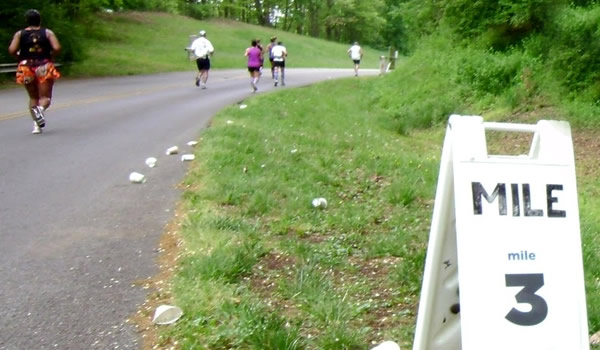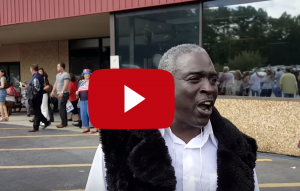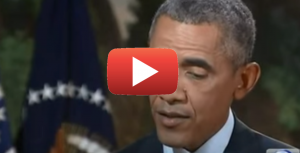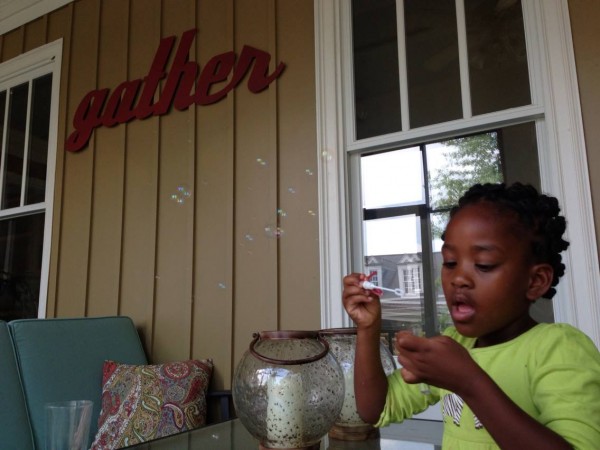
Today I’ll be speaking at the graduation for a Christian home-school group here in Tennessee.The group won’t be large, but the kids are impressive (as are their families). I feel honored to speak to them. In thinking about what to say, I thought a great deal about what it means to be “privileged” and whether it’s truly a label to be shunned or a description to be embraced. Upon reflection, “privileged” is an accurate description — not just for the elite in this country, but for all of us blessed to live in a free nation, the wealthiest and most powerful in the world. The remarks I plan to give about how to live a life of privilege (absent the hopefully humorous asides) are are follows:
Before I congratulate you, I’m going to begin with a confession.
I’m pretty unsentimental about graduations. To be honest, I’m unsentimental about most things, but I’m especially unsentimental about graduations.
I like the biblical description of our life’s journey as a race. In fact, in describing this race of life, the writer of Hebrews implies the race is long, urging us to “run with endurance the race that is set before us.”
Run with endurance. One doesn’t need endurance in a hundred-yard dash.
These words provide some biblical heft to the old cliché that life is a marathon, not a sprint, and if it is a marathon, a graduation sometimes feels a bit like stopping at, say, mile three to celebrate with friends and family. At mile three in a real marathon, you’ve barely worked up a sweat. In fact, you have no idea whether you’ll even be able to complete the race.
While it’s certainly an accomplishment to get the first three miles down — after all, you could collapse out of the starting gate – it’s not really that much of a milestone.
That will become even clearer to you later in life, as you watch the miles grind by with absolutely no fanfare, doing harder things than you’ve ever done before. After all — and let’s be real — work is much harder than school.
I’ll never forget my first weeks of real work in a law firm after I graduated from law school. I’d basically crawl home at night, lie on the couch, without even the energy to lift the remote and change the channel. After eleven hours or more of high-intensity, high-stakes work in a big law firm, the very idea of scanning a channel guide seemed like too much work. That’s how pitiful I was — completely exhausted by the purely mental effort and strain of legal work — when others work their bodies nearly to death.
So I’d lie there, glassy-eyed, as an hour or two of intolerable television played on the screen. Then I’d fall asleep, wake up, and start the cycle all over again.
After some time, like all the other young lawyers I worked with (who were also shocked at the ease of law school compared with the challenge of work), I trained my mind and body to run the work phase of my life’s race with a bit more endurance, so that the end of the day meant not a night lying on a couch, but a night working out to stay in shape, meeting and praying with members of my church, and — yes — the first beginnings of my future life in the grand right-wing conspiracy.
In fact, looking back, my own graduation celebrations seemed wildly disproportionate to my actual accomplishment. Years after graduation — by God’s infinite mercy and grace — I was able to participate in much greater things than a successful schooling, participating, for example, in cases that had a real impact on lives and individual liberty and later defending our nation from a deadly enemy abroad. The accomplishments in those arenas were celebrated not with gatherings like this but instead by dinners with friends and colleagues, a meaningful handshake, a nod of approval, or sometimes by nothing at all.
Going back to our race analogy, if you’re at mile three, with 23 to go, what would you appreciate more, someone throwing a party at your early progress? Or someone sharing thoughts that could help as you prepare for the challenges ahead?
The thoughts are probably more useful than the party, so let’s do that — let’s discuss a few things I wish I’d known when I was where you are — finishing mile three and staring at the road ahead, perhaps even glimpsing some very steep hills ahead.
First, let’s set the stage. Who are you? Let’s be clear, you are a person of enormous privilege. I bring up that word specifically because you’ll hear it quite a bit at college. In fact, questions of privilege are dominating campuses these days, and the phrase “check your privilege” is a common way of telling certain people — mainly straight, white men (especially southern, straight white men) — to shut up and listen to everyone else.
You see, in the college world, no one wants to be privileged. Everyone wants to be oppressed. Everyone wants to be the victim. Why? Because in college the oppressed have all the privileges.
So it becomes fashionable to talk about how tough our lives are, how much our families have endured, how much we’ve persevered to get where we are. It’s a self-exalting race to misery — all to show how strong and hard-working we are to overcome the injustice all around us.
And most of it is quite false.
I’d challenge you to do something different. Don’t race to the bottom. Don’t beat your chest over your own triumphs. Instead, embrace your privilege — but embrace it in a biblical way, a humble way.
You can acknowledge your hard work, but you can also acknowledge that — unless you immigrated to this country through your own efforts — you did nothing to earn your citizenship in the United States, the wealthiest, most powerful country in the history of the world. For almost every American, being born here is — to borrow a baseball analogy — like starting life on second base, even when some enjoy more advantages than others.
What a privilege.
If you’re one of the rare few who immigrated here through your own effort, you still enjoy the privilege of the blood-bought civil liberties and mighty economy that — even when it’s relatively stagnant — can still provide incredible opportunities for the ambitious and hard-working.
Did you have to storm the beaches at Normandy? Did you have to hold the line at Gettysburg? Yet you get to enjoy the fruits of those horrifying and terrifying labors.
What a privilege.
That’s not to say that you haven’t faced adversity, won’t face further adversity, or that others in this country face less adversity than you will. Of course some people have it tougher than others, and it’s right to acknowledge that reality, but everyone in this country — men and women of every color and creed — enjoy immense privileges, world-historical privileges in fact.
Ok, so we’re privileged. So what?
Embrace the responsibility that comes with your privilege. In the Gospel of Luke, Jesus declared that to whom much is given, much is required. In the comics of Marvel, Spiderman was told that with great power comes great responsibility.
Our privileges do not exist for our self-satisfaction — though they can make life fun. Our forefathers did not sacrifice their lives so that we could live a life of navel-gazing and self-indulgence.
Christ’s admonition applies to us all. “Take up your cross,” He said. “Lose your life,” He said.
Embracing our responsibilities means leading with our actions, not just our words. Your words do not make you good. Your words do not make you virtuous. Your words do not make you admirable.
We live in an era where people say, with a straight face, that they are fighting for “social justice” by doing things like “speaking out” with a . . . hashtag. Yep, a hashtag. Or an Instagram post. Or a Facebook share.
Don’t confuse speaking with doing. There’s no shortage of Christians who wring their hands declaring, for example, that the church doesn’t do enough for widows and orphans, for the least of these. Wringing one’s hands about the church’s deficiencies — even apologizing for them to your secular friends (something that does nothing for the church but everything for you) — doesn’t put food in a single mouth.
Think the church doesn’t do enough for widows and orphans? Then care for widows and orphans.
Think your generation doesn’t do enough to serve your fellow man? Then serve your fellow man.
I’ll never forget when the reality of my own deficiencies hit me between the eyes.
I was living in Philadelphia with my wife and (then) two kids — we have three now — and life was good. We had a great penthouse apartment, I had a great job “speaking out” for constitutional liberties like free speech and religious freedom, and — while not by any means wealthy — we certainly had enough money to enjoy life.
One evening I was reading the newspaper and came across two stories about the Iraq War. It was 2005, and the war was going badly. Sectarian violence was spinning out of control, and Army recruiting was suffering. It seemed that not many people wanted to join the military and be shipped off to fight a losing war.
The first article detailed the Army’s effort to recruit older soldiers. I read it, looked at my wife in disgust, and said something like, “America is just too soft to fight a long war.”
I kept reading on to the second story — describing a firefight in an Iraqi town — and read how an officer was wounded (a man about my age) and used a reporter’s satellite phone to literally call home, to tell his wife and two children that he was hurt but that he’d be ok.
That’s when my conscience stopped me cold. America wasn’t too soft to fight a long war. I was too soft.
And I had no excuse. Think about that wounded officer. Did he love his wife less than I loved my wife? Did he love his kids less than I love my kids? Yet he was risking everything, and I was risking nothing.
So I enlisted. I became a JAG officer in the United States Army and deployed to Iraq as part of the Surge in 2007 — attached to the 3rd Armored Cavalry Regiment.
And that brings me to my next point.
When you do speak, speak humbly from experience, not proudly — secure in the rightness of your opinion.
When I was your age, I knew a lot more than I know now. I was a voracious reader — my parents still have pictures of me sitting on the floor with encyclopedias fanned out around me — and my reading taught me what I needed to know. And oh how I lorded that knowledge over my less well-read peers.
In hindsight, I must have been moderately insufferable.
I thought I knew about the homeless, until I spent night after night in shelters in Nashville, talking to them, sleeping next to them, and making meals.
I thought I knew about inner cities, until I mentored a kid from the projects in East Nashville and gained just the smallest insights into his world.
I thought I knew I knew how to help the poor, until my wife and I reached out to the poorest and most desperate members of our community, naively certain that our love, concern, and money was enough — enough to change lives.
And I thought I knew about war, until I went to fight, lost friends, and saw the reality with my own eyes.
By God’s grace, I pray I’ll never think I know as much as I once thought I did.
Finally, as you humbly embrace the privilege others have given you, as you embrace your responsibilities by emphasizing doing over speaking and — when you do speak — speaking humbly from experience rather than proudly from opinion, your most critical responsibility will be to depend.
Depend completely on God.
On November 22, 2007 — remember that date — I flew into Forward Operating Base Caldwell in Diyala Province, Iraq, to start my deployment.
I was terrified.
What felt a bit like a heroic adventure from a distance felt foolish and scary up close. As I looked over the shoulder of the door gunner into the dark Iraqi night, I saw tracers arc across the night sky, and it felt all too real.
So I prayed. Hard.
I asked God for peace, for assurance that I would make it home and that I would hold my wife and kids again.
No assurance came.
I prayed throughout my deployment. Every night when I fell asleep, every time a friend and brother fell, every time I put on my gear (we called it “battle rattle”) to go outside the wire.
No assurance came. No assurance ever came.
A year later, when I was home, I must admit that I was struggling — struggling with grief at lost friends, struggling at re-integrating with a family that got along quite well without me, and struggling with winding down from the stress of life and death decisions to the non-stress of whether to take my coffee decaf at Cracker Barrel.
I prayed once again, prayed once again to feel God’s presence, His comfort.
As I prayed, I was reviewing the paperwork for our adoption. We were in the process of adopting a little girl from Ethiopia, and we had just received our referral. We were sobered. When she was abandoned to the orphanage, she was terribly malnourished. At two years old, she weighed only 14 pounds.
But — no matter her condition we loved her, instantly.
As I examined her medical information, I came across her birthday.
November 22, 2007.
The very day that I was praying to God as I flew into Iraq, worried whether I would see another day, God was preparing the next phase of my family’s life — in a tiny village in southern Ethiopia, thousands of miles away.
God knew His plan for my family. And He knew that I just needed to trust Him, to depend on Him.
And so do you. Unlike any person you know, He will never fail.
As you look up to the miles ahead, in your life’s race, be thankful for the legacy of service and sacrifice that’s equipped you for the challenge, resolve to run it with honor and perseverance, and understand that your ability to endure and finish comes only from God, a God who loves you and orders your every step in the marathon to come.
Congratulations graduates, three miles down, a long 23 to go. May God bless you on the journey ahead.
— David French is an attorney and a veteran of the Iraq War.
Read more on the Patheos Faith and Family Channel and follow David on Twitter.









